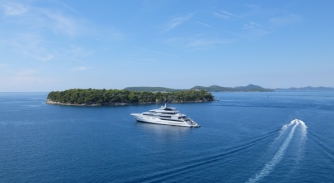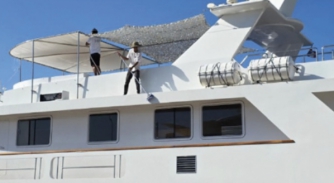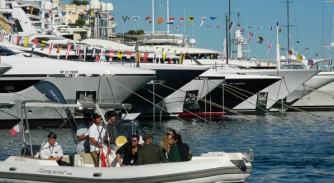Time for a sea change
Dr Emma Gillett DC, CEO and founder of SeaFeedback, highlights the historic and endemic issues faced by crew and how they can be addressed…

There’s an insidious problem in the yacht industry which was apparent almost immediately to me, having worked in a completely different field for 31 years prior to stepping on board. I had come from a background of the highest of ethical codes of conduct and regulatory oversight that would make most in yacht management pale at the very thought.
Being brought up to understand the real value of the time and culture it takes to develop the right candidate into a well-functioning professional with integrity and skill, when I moved to yachting what I found was remarkable, witnessing entry-level crew some 30 years my junior and those who had been formed, like a cliff-top tree, to bend over time to the industry forces.
Working within a fleet that had considerable problems that were keeping my boss awake at night, confused that shoreside staff were lifetime installations but crew and the yachts were a mess. Captains and management feigned ignorance, so the boss asked me why crew weren’t being retained. I wrote an in-depth report from the crew perspective – and it was commented upon: “I knew things were bad but not this bad!”
It changed the fleet going forward.
Crew are our biggest asset and yet we treat them as disposable.
There’s a problem with sycophancy that even our very smart owners do not yet recognise. It’s dishonest and only goes to compound the losses and fracture the dream of yacht ownership. Although we have many codes and regulations, standards and laws, we have no ability to enforce compliance. No open transparency, no simple codes of conduct, leaving us with a convoluted and unworkable regulatory structure. Add to this the common practice of multiple roles within the industry or management and we begin to see the myriad conflicts of interest and see the unspoken that allows non-compliance to flourish. Our regulations are our safety net.
Crew are our biggest asset and yet we treat them as disposable, with no clear appraisal for entrance to STCW, and educational pathways being almost non-existent. This results in ill-prepared individuals being brought on board and then our culture is to completely shut down their voices and their insights. There is no long-term strategy, no mentoring, no ‘apprentice-ship’ … but there is plenty of intimidation.
Opinions are “like a**holes, everybody’s got one” and “We employ you from the neck down” are common industry mantras being actively used today by some in management, when it is developmental to oblige them for insights and their professional views of the yacht.
A 2024 survey of seafarers’ by the World Maritime University yielded several key findings, culminating in a report called Quantifying An Inconvenient Truth.
• Non-compliance with work/rest limits: A noteworthy 88.3 per cent of seafarers admit to exceeding work/rest hours limits at least once a month. Alarmingly, 16.5 per cent exceed the limits more than 10 times a month.
• Record keeping adjustment: Only 31.6 per cent of seafarers admit to never adjusting their records.
• Reasons for adjustment: The main reasons for adjustment are: first, to avoid non-conformities during inspection (80.2 per cent); second, to avoid problems with the company (75.0 per cent); and third, to gain financial benefits (31.1 per cent).
• Response to non-compliance: Only 50.3 per cent of seafarers report non-compliance to their company. Companies reportedly question or neglect non-compliance reports in most cases. In only 22.4 per cent of cases do companies respond by providing additional crewing.
• Workload challenges: For 87.6 per cent of seafarers, there is an imbalance between work demand and crewing levels.
For years such issues have been denied, dismissed or hidden and a blatant disregard for professional voices has forced vessels and crews into dangerous non-compliance and possible criminality.
Although this is commercial data, it provides a vital insight because we don’t have such data for our own industry. We have been remiss not to ask. Crew silence about these endemic practices is our biggest issue.
For years such issues have been denied, dismissed or hidden and a blatant disregard for professional voices has forced vessels and crews into dangerous non-compliance and possible criminality. Insurance companies are aware of the non-compliance, denying claims and invalidating policies, bringing this into stark focus. If it can be shown that the management chain knows or promote non-compliance shoreside then culpability must be shifted. If no measures were then put in place, collated data would be enough to prove where the non-compliance stems from.
This is where absolute transparency would bring dynamic information and drive actions that were never previously sought. Transparency of data shifts culpability. Clear, obvious and corroborated data from every department on board will ensure regulations are no longer ‘Opt In’ and practices both ashore and on board will have to change to comply with our codes and laws.
SeaFeedback’s mission
SeaFeedback has been created to provide a comprehensive and confidential, professional feedback platform, offering crew a reporting structure to help safeguard, enforce and support the industry’s laws and regulations. Crew members of a licensed vessel can provide their insight directly from their phone 24 hours per day, empowering them to act and report within their professional roles.
Data is collected, collated, reported and stored so that management and owners know the full extent of functionality of a vessel in real time. This data is held in absolute confidentiality by an independent third party, giving transparency for a vessel in real time.
It will allow us to see and drive industry-wide improvements to catalyse evolution, eradicate toxic practices and reinforce developed professionalism across the yacht industry.
Currently we are suffering too many losses. It’s time to evolve.
Any views, thoughts and opinions expressed here are those of the author and are not intended to malign any particular individual or organisation and may not reflect the views, opinions, policies or positions of The Superyacht Group.
As an open-source platform we offer an industry-wide invitation to anyone and everyone in our sector to share their knowledge, experience and opinions. So if you have an interesting and valuable contribution to make, and would like to join our growing community of guest columnists, share your ideas with us at newsdesk@thesuperyachtgroup.com
NEW: Sign up for SuperyachtNewsweek!
Get the latest weekly news, in-depth reports, intelligence, and strategic insights, delivered directly from The Superyacht Group's editors and market analysts.
Stay at the forefront of the superyacht industry with SuperyachtNewsweek
Click here to become part of The Superyacht Group community, and join us in our mission to make this industry accessible to all, and prosperous for the long-term. We are offering access to the superyacht industry’s most comprehensive and longstanding archive of business-critical information, as well as a comprehensive, real-time superyacht fleet database, for just £10 per month, because we are One Industry with One Mission. Sign up here.
Related news

Don’t wait – lead
EU sustainability rules are changing – Water Revolution Foundation outlines what this means for yachting
Business

Chirp Report: Working aloft without proper PPE (again!)
Reporting on the dangers of working aloft when the crew’s safety is completely disregarded
Crew

Millions in unpaid wages secured for crew
Crews recovered £2.17m in unpaid wages via Nautilus in 2024, bringing to the fore persistent challenges as union support in the sector increases
Crew

Preventing sexual harassment on board yachts
Hill Dickinson’s Francesca Conn, Legal Director, and Caroline Prosser, Partner, offer advice on how best to prevent sexual harassment on board
Opinion

Happy crew, happy you
Captains who lead by example, showing respect, fairness and support, will not only boost on-board morale, but also mean crewmembers will work more efficiently,
Opinion

Who’s next to carry the boat baton?
If the industry is really serious about addressing its talent shortages, it needs to make more effort to open doors for people who are not traditionally drawn t
Opinion
Related news
Don’t wait – lead
1 month ago
Millions in unpaid wages secured for crew
3 months ago
Preventing sexual harassment on board yachts
3 months ago
Happy crew, happy you
4 months ago
Who’s next to carry the boat baton?
4 months ago
NEW: Sign up for
SuperyachtNewsweek!
Get the latest weekly news, in-depth reports, intelligence, and strategic insights, delivered directly from The Superyacht Group's editors and market analysts.
Stay at the forefront of the superyacht industry with SuperyachtNewsweek



